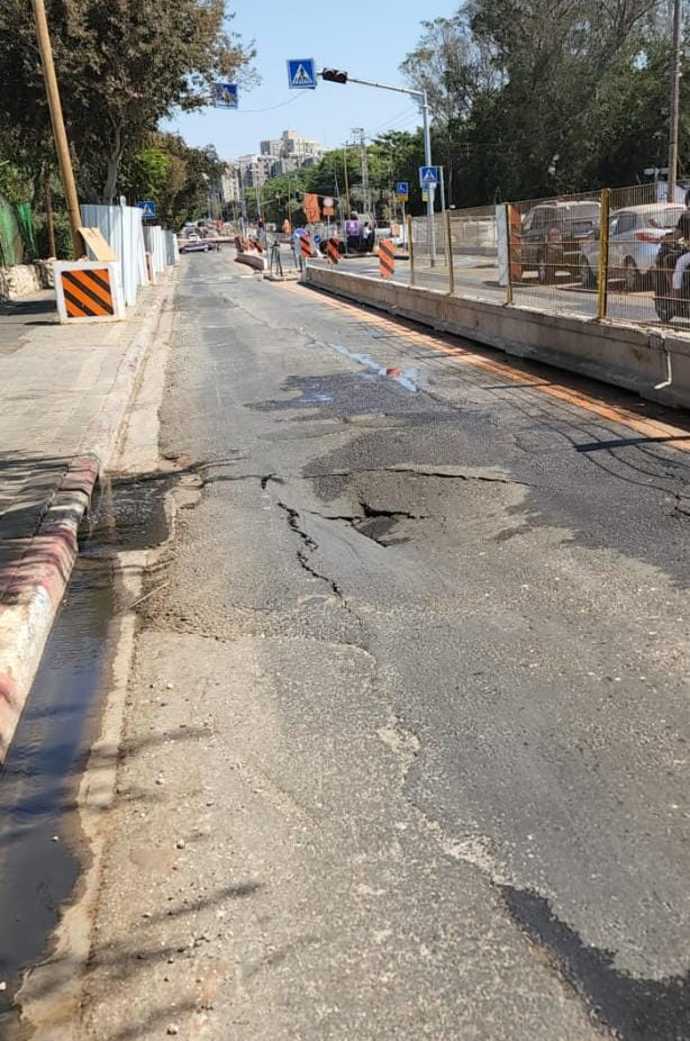Depending on your faith perspective, it was either a miracle or sheer luck that a sinkhole opened up on one of the most-traveled portions of highway in Israel on a Saturday evening – a time of the week when traffic is usually at its lightest.
It's shuddering to think about the consequences if the sinkhole on the Hashalom exit ramp of the Ayalon Expressway had opened up just 12 hours later, when Sunday morning drivers commuting to work usually jam the exit.
Either way, a major potential tragedy was averted. But relying on miracles (or luck) is no way to conduct infrastructure policy.
Authorities are still examining the circumstances surrounding the sinkhole's creation, but the current theory is that excavations for construction work near the highway allowed groundwater to rush into a cavity under the roadbed, weakening it and eventually leading to the collapse.
So, is there any way to prevent highway sinkholes in the first place? Like with any other phenomena, it's all about the data; the more you know about a situation, the more information you have about the cause, and the better you can apply subsequent cures. And fortunately, the technological infrastructure to prevent sinkholes – in the form of collected data and the ability to analyze it - exists right now.

Sinkholes are by no means rare - they happen in places from Maryland to Atlanta to Canada to India – but they aren't common enough for a tech company to invest in a solution specifically to prevent them.
However, existing technology that monitors traffic patterns, weather, street conditions, and dozens of other aspects of road transportation generates huge amounts of data that, if applied and analyzed properly, could give authorities an idea of what roadways are weak, or possibly in danger of collapse.
Using AI-based data analysis
Using advanced artificial intelligence-based data analysis, authorities could use data that is already being collected to prevent all sorts of unwanted incidents – including road collapses.
That data is currently collected by a slew of existing traffic cameras, roadbed sensors, and uploads from smart vehicles. It's already used by policymakers to ensure safer roads, especially when road collapses are occurring too frequently on a specific stretch of highway.
For example, AI systems analyze the data associated with those accidents and that section of the road to determine the cause – such as if a curve on the road is too sharp for the recommended speed or if an additional lane is needed.
Such road and traffic data are also being used today to reduce congestion, with AI systems determining the most efficient deployment of traffic lights, enabling officials to develop systems to prompt drivers to take alternate routes, or determining the best places to build new exits and interchanges.
And that same data can be used to predict potential road collapses – giving authorities an opportunity to fix the problem before it happens.
Sensors and cameras already in place on major highways around the world (including the Ayalon) monitor traffic, weather conditions, congestion at specific times of the day, accidents, and much more.
Data collected on peak road usage, for example, could be analyzed together with data on how a road was constructed – what materials were used, whether there are any water channels (including pipe infrastructure) or gas lines adjacent to the road, and what construction or other underground work is going on in the area.
By analyzing all that data, the systems can determine if the road is in danger of collapse from usage that was far beyond what its developers anticipated.
If the analysis shows that a section of road is getting overstressed because of too many vehicles, or that other stress elements are present – like a potentially compromised roadbed due to nearby construction - the system would issue an alert, prompting officials to take immediate action to bring the road up to standards that ensure full safety.
AI-based analysis can thus ensure that authorities act as efficiently as possible – allowing them to free up and redirect resources to repair trouble spots that need immediate help.
Rekor's AI systems
In addition, AI systems constantly learn from collected data – in the case of big organizations like Rekor, the data pours in from the many sites where our technology is installed.
When an incident occurs in one location, systems analyze the road conditions that were associated with that incident and compare them to conditions based on data collected from other sites.
Although roads and the conditions surrounding them - including weather, topography, and the way they are used - vary from location to location, data that is properly analyzed can provide game-changing insights into potential problems, thus enabling officials to take the appropriate actions to avoid those problems.
AI, of course, isn't foolproof; systems are rife with false positives, and it's up to the human masters of AI analysis systems to act on alerts.
But thanks to AI-based data analysis, we don't have to fly (or in this case, drive) blind. Data can help us prevent accidents, improve road infrastructure, reduce traffic congestion – and maybe save lives, time, and frustration by ensuring that we don't end up on a highway with a sinkhole.
